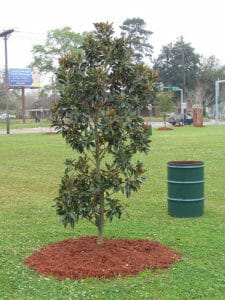Why mulch? Because mulching improves water retention, optimizes soil temperature, and reduces general stress on plants and plant roots. Mulch also keeps weeds out and prevents soil compaction. Finally, mulch adds to the quality of the soil as it decomposes. In this article, we’re exploring all things mulch, from proper mulching technique to types of mulch to common mistakes to avoid.
How to Mulch Your Tree
Clear away grass around your tree within a 3 to 10 foot area, depending on the tree size. Add natural mulch to this cleared area, about 2 to 4 inches deep, but ensure mulch does not touch the trunk of the tree. If mulch is piled up around the tree trunk, it will limit the tree’s ability to take in oxygen and nutrients. Consult Portland arborists to learn more about proper tree mulching practices and general best practices for Portland tree care.
Mulching Mistakes to Avoid
Mulching is a very important aspect of caring for your trees and plants, but acting without enough information may result in unfortunate mistakes. Mitigate these risks by following our recommendations on what not to do when mulching:
 Don’t over-mulch. Too much mulch can cause plants to become stressed in harsh weather conditions. The standard recommended mulching depth is 3 inches.
Don’t over-mulch. Too much mulch can cause plants to become stressed in harsh weather conditions. The standard recommended mulching depth is 3 inches.- Understand how different mulching materials decay. Some mulches last longer than others. For instance, tree trimmings decay quite rapidly, so if you use them as mulch you may need to mulch more frequently.
- Don’t pile mulch around the base of the tree. Sometimes called “volcano” mulching, this practice piles up mulch around the trunk. Not only does this suffocate parts of the tree that are designed to be open to the air; it also promotes the growth of harmful fungi. Leave a six-inch mulch-free radius around the trunk. Outside of this ring, plan to mulch all the way to the tree’s drip line.
- Be picky about your mulch. When purchasing mulch, make sure you are getting it from a reliable source. Mulch that was stored near weeds, or which has grown fungus could negatively impact your tree’s health.
Choosing the Best Mulch for Your Trees
Mulch is a blanket term that contains a wide variety of products, each with their own unique form and specialty. The two main categories are organic and inorganic mulch. Organic mulch decomposes and provides additional nutrients to the soil. While organic mulch has to be replenished more often, it is often preferred for its nutritional benefits. Inorganic mulch provides good surface drainage, discourages soil splash onto plants, and daunts moss. Inorganic mulch does not decompose and thus does not need to be replaced as often.
Common organic mulch includes:
• Farm manure, which is good for shrubs and roses and is useful for nutrients;
• Composted bark, which is good around trees and shrubs, particularly acid-loving plants, and is quite nutritious;
• Wood chips that decompose slowly and take nitrogen from the soil;
• Garden compost that prevents weed seeds from germinating and supplies gradual nutrients;
• Composted straw, which may contain weed seeds and is low in nutrients, but can also be useful;
• Mushroom compost, which supplies some nutrients and decays slowly, but is not recommended for use around acid-loving plants.
Common inorganic mulch includes:
• Gravel, which is good for drought tolerant plants;
• Cobbles and pebbles, which are an attractive way to mulch;
• Coarse grit and stone chips, which can be ideal for small plants such as succulents in raised beds;
• Black plastic sheeting, which can suppress weeds and is often laid around new trees and shrubs. Geotextile membranes are often useful to retain moisture and suppress weeds around newly planted trees and shrubs.
Of course, Portland arborists will have the best information on Portland tree care. Thus, if you are stumped by which mulch to choose, or how to properly place your mulch, it’s best to consult the experts. Arrange for Portland tree services with our ISA certified arborist. From mulching to pruning to tree removal, Urban Forest Professional’s arborists will provide the expertise and technique to keep your trees growing strong.
 Don’t over-mulch. Too much mulch can cause plants to become stressed in harsh weather conditions. The standard recommended mulching depth is 3 inches.
Don’t over-mulch. Too much mulch can cause plants to become stressed in harsh weather conditions. The standard recommended mulching depth is 3 inches.